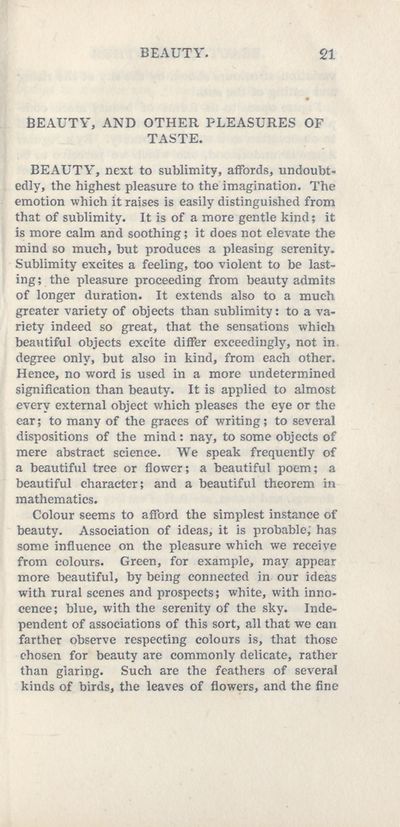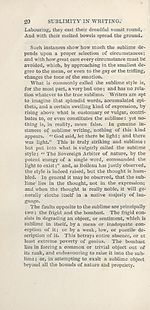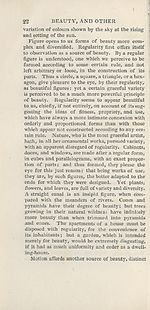Education > Essays on rhetoric
(49)
Download files
Complete book:
Individual page:
Thumbnail gallery: Grid view | List view

BEAUTY.
21
BEAUTY, AND OTHER PLEASURES OF
TASTE.
BEAUTY, next to sublimity, affords, undoubt¬
edly, the highest pleasure to the imagination. The
emotion which it raises is easily distinguished from
that of sublimity. It is of a more gentle kind; it
is more calm and soothing; it does not elevate the
mind so much, but produces a pleasing serenity.
Sublimity excites a feeling, too violent to be last¬
ing; the pleasure proceeding from beauty admits
of longer duration. It extends also to a much
greater variety of objects than sublimity; to a va¬
riety indeed so great, that the sensations which
beautiful objects excite differ exceedingly, not in
degree only, but also in kind, from each other.
Hence, no word is used in a more undetermined
signification than beauty. It is applied to almost
every external object which pleases the eye or the
car; to many of the graces of writing; to several
dispositions of the mind: nay, to some objects of
mere abstract science. We speak frequently of
a beautiful tree or flower; a beautiful poem; a
beautiful character; and a beautiful theorem in
mathematics.
Colour seems to afford the simplest instance of
beauty. Association of ideas, it is probable; has
some influence on the pleasure which we receive
from colours. Green, for example, may appear
more beautiful, by being connected in our ideas
with rural scenes and prospects; white, with inno¬
cence; blue, with the serenity of the sky. Inde¬
pendent of associations of this sort, all that we can
farther observe respecting colours is, that those
chosen for beauty are commonly delicate, rather
than glaring. Such are the feathers of several
kinds of birds, the leaves of flowers, and the fine
21
BEAUTY, AND OTHER PLEASURES OF
TASTE.
BEAUTY, next to sublimity, affords, undoubt¬
edly, the highest pleasure to the imagination. The
emotion which it raises is easily distinguished from
that of sublimity. It is of a more gentle kind; it
is more calm and soothing; it does not elevate the
mind so much, but produces a pleasing serenity.
Sublimity excites a feeling, too violent to be last¬
ing; the pleasure proceeding from beauty admits
of longer duration. It extends also to a much
greater variety of objects than sublimity; to a va¬
riety indeed so great, that the sensations which
beautiful objects excite differ exceedingly, not in
degree only, but also in kind, from each other.
Hence, no word is used in a more undetermined
signification than beauty. It is applied to almost
every external object which pleases the eye or the
car; to many of the graces of writing; to several
dispositions of the mind: nay, to some objects of
mere abstract science. We speak frequently of
a beautiful tree or flower; a beautiful poem; a
beautiful character; and a beautiful theorem in
mathematics.
Colour seems to afford the simplest instance of
beauty. Association of ideas, it is probable; has
some influence on the pleasure which we receive
from colours. Green, for example, may appear
more beautiful, by being connected in our ideas
with rural scenes and prospects; white, with inno¬
cence; blue, with the serenity of the sky. Inde¬
pendent of associations of this sort, all that we can
farther observe respecting colours is, that those
chosen for beauty are commonly delicate, rather
than glaring. Such are the feathers of several
kinds of birds, the leaves of flowers, and the fine
Set display mode to:
![]() Universal Viewer |
Universal Viewer | ![]() Mirador |
Large image | Transcription
Mirador |
Large image | Transcription
| Antiquarian books of Scotland > Education > Essays on rhetoric > (49) |
|---|
| Permanent URL | https://digital.nls.uk/113760080 |
|---|
| Description | Thousands of printed books from the Antiquarian Books of Scotland collection which dates from 1641 to the 1980s. The collection consists of 14,800 books which were published in Scotland or have a Scottish connection, e.g. through the author, printer or owner. Subjects covered include sport, education, diseases, adventure, occupations, Jacobites, politics and religion. Among the 29 languages represented are English, Gaelic, Italian, French, Russian and Swedish. |
|---|

